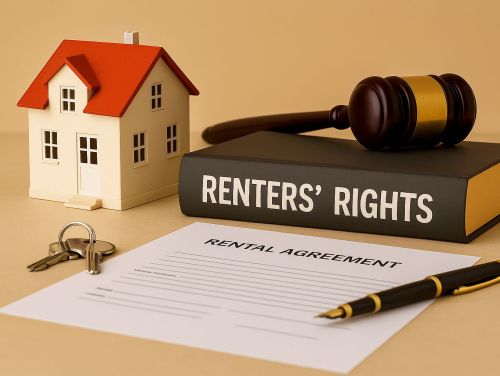27 November 2025
SHW - Renters' Rights Act begins implementation journey on 1st May 2026
Business Rates, Commercial, Industry News, Professional services, Property Management, Rent reviews & Lease renewals, Residential, SHW News
The Renter’s Rights Act finally received Royal Assent on 27th October and is now law, several of the key elements being implemented from the 1st May 2026. The elements include:

• The ban on Section 21 notice evictions
• A ban on Rent Review Clauses with Landlords only able to increase rents via a Section 13 Notice and not more than once per year
• Landlords prohibited from asking for more than one month’s rent payment in advance
From this date, landlords will also be prohibited from accepting rental offers higher than the rent advertised and from discriminating against potential tenants who receive benefits or have children.
‘Phase 2’ of the changes are reported to be coming in ‘October 2026’ which will introduce the Private Landlord Ombudsman and the Private Rented Sector Database, with the requirement for landlord to sign up and pay a fee for both services.
Here’s what you need to know…
Abolishing Section 21
Section 21 Notices are being withdrawn from 1st May 2026, which will effectively mean tenants will have security of tenure and landlords will be unable to recover possession of the properties unless there has been a breach under one of the Prescribed Clauses, or they are looking to move into the property, sell or develop.
End of Fixed Term Tenancies
Leading on from the abolishment of Section 21, as tenants effectively have security of tenure, Fixed Term tenancy agreements will also be a thing of the past, with all tenancies either starting or being converted into Periodic Tenancy agreements from day one.
Periodic tenancies
Going forward, as of 1st May 2026, the tenant can serve two months’ notice. At any point. This even applies to tenancies with a fixed term that commenced prior to 1st May 2026, as they will transition to periodic tenancies from Day 1. The notice will need to coincide with the rent due date and expire on the last day of a rental period.
Therefore, if a tenant’s rental periods runs from the 1st to 31st of the month, and they serve notice on the 15th of the month, the two-month notice period will not commence until the 1st of the following month and expire on the last day of the month - two months thereafter.
The landlord notice periods will differ depending on the clause under Section 8 that they are relying upon.
No more rent in advance payments
Where sometimes tenants are moving from abroad, may be students, or just cannot afford the monthly rent, landlords and agents have been able to take six to 12 months’ rent up front as security to cover the rent. Under the new proposals, as of 1st May 2026, advance rental payments will not be permitted - unless specifically requested by the tenant. However, even with this in writing from the tenant, the landlord will be open to scrutiny, so it may be advisable to steer clear of this option altogether. Landlords and agents will not be allowed to request or suggest the tenant pays a lump sum upfront.
First month rental payments cannot be collected until after the tenancy agreement has been executed. In addition, deposits taken can only be of monetary value up to the equivalent of five weeks’ rent.
The negative impact of this will be affordability for some tenants. The new rules will make it difficult for potential tenants and overseas students - that do not meet the affordability criteria or have guarantors – to ensure this with up front rental payments.
End of ‘bidding wars’
Landlord and agents, from 1st May 2026, will not be able to ‘engage in bidding wars’. No rents over the asking price will be able to be accepted. This is likely to mean that asking rental levels will be increased, which in turn will push up market rates, affecting affordability for some prospective tenants.
Landlords selling / moving in
As of 1st May 2026, there will be a new possession clause under Section 8 which will allow landlords to serve notice for possession on the grounds that they require their property back as they are selling or looking to move in.
Landlords will need to serve four months’ notice, and the tenants would need to have been in occupation for at least 12 months from the date the possession notice is due to expire. Therefore, if a tenant moves in on day one and the landlord looks to sell their property, they cannot serve notice for possession until month eight to expire on month twelve.
If the sale of the property is unsuccessful, the landlord will not be able to relet their property until after 12 months from the date they have recovered vacant possession.
Section 13 – rent reviews / increases
Landlords will now only be able to affect a rent increase once per year. And this will be capped at ‘market rent’. Notice of rent increase will be at least two months.
However, tenants are able to dispute a rent increase (free of charge) via the First Tier Tribunal. This may become an issue as, once more tenants get word of this, tribunal cases may increase causing a backlog on the system. And tenants will continue to pay the current level of rent for the duration of the tribunal. It remains unclear at present whether landlords will be able to backdate this increased level of rent if the FTT find in favour of the landlord and whether landlords will have to foot any of the bill for the dispute. It may be that back payments will be at the discretion of the court.
Pets
The new Act has put into place measurers to enable tenants to have pets. Landlords can no longer issue a blanket ban on pets and must consider a tenant’s request on this matter. Tenants must seek prior written consent, and landlords must provide a good reason for refusal – such as the property being unsuitable for animals (i.e. a large dog in a studio flat), or a clause in the head lease prohibiting pets.
If a landlord grants permission for pets, they will be able to request a tenant obtains pet insurance. However, there is a risk that the insurance may not be enough to cover any damage caused or that a valid pet insurance policy is maintained throughout the tenancy by the tenant. In some cases, it may make sense for the landlord to take out their own insurance to make sure that it is a) enough and b) goes straight to the landlord.
Future changes
“From October 2026, new rules will come into place requiring landlords to register with the ombudsmen and onto a PRS database.”
It is expected that from October 2026, new rules will come into place requiring new landlords to register with the ombudsmen and onto a PRS database. It is also expected that a fee will need to be paid for each property. And that all individuals registered to a property will have to apply for separate licenses.
It is believed that these measures are being put into place to provide transparency on issues such as whether landlords have any banning orders, unspent convictions or financial penalties, as well as a landlord’s history of compliance, confirmation of Electrical Safety and Gas Safety certificates. However, the full details for this are currently unclear.
It is also understood that under the ombudsmen, tenants can raise complaints against a landlord, however landlords cannot do the same for tenant issues.
Landlords will be unable to let properties without signing up to both the Ombudsman scheme and Landlord database.
Currently there are no plans to remove the current landlord licensing schemes (Selective or Additional Licenses) set up by some councils, although the new Landlord Database looks set to cover most of the items typically found in the Selective and Additional License requirements. Therefore, landlords may have to pay into three separate schemes. If the licensing schemes are removed from October 2026, there may be a rush for more councils to push to set up schemes before this date.
Further changes that are not yet clarified include Awaab’s Law and The Decent Homes Standard. Awaab’s Law is currently in effect in public sector housing, but it remains to be seen when this may come into effect in private housing. And the Decent Homes Standard will be phased in at a future date.
These changes are happening, with some of them coming in earlier than expected.
We are keeping abreast of changes and will keep you up to date with these.
For more information, contact:
Duncan Bannister
Partner
SHW
020 8662 2722




